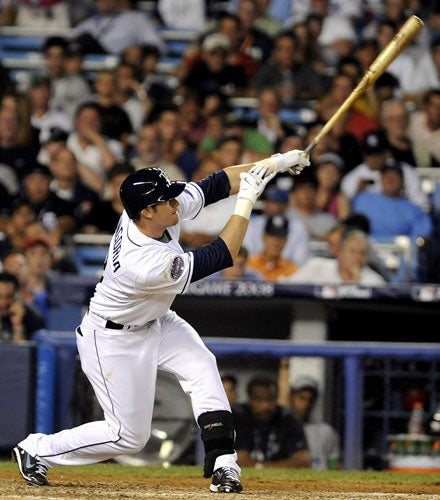Baseball: The American dream thrives on a level paying field

Forget the Olympics, and forget the rumbles of distant thunder from the NFL. Gridiron may be America's sport of the 21st century, but right now it is still confined to the training camps as teams prepare in the scorching summer heat for the new season a month away. Basketball and hockey too are dormant. Here in the United States this is baseball's unshared moment. And 2008 is a year to be savoured.
Across the leagues attendances are soaring – even here in Washington, where an average of 30,000 turn out to watch the pitiful Nationals, current owners of the worst record in baseball. No longer does the sport labour under the incubus of Barry Bonds, the steroid-fuelled home-run king. The San Francisco Giants refused to re-sign him for 2008, and no one else was interested. This year fewer home runs are being hit, suggesting that baseball's drug problem has been contained, if not eradicated. Best of all, the pennant races are upending predictions.
Thus far the teams have been playing for show. But now, in the two-month push to make the October play-offs and the World Series, every game matters. Usually the script can be written in advance: the New York Yankees and Boston Red Sox continue their private duel in the American League East; in the rival National League, Atlanta, St Louis and Los Angeles will be there or thereabouts. Not necessarily this year.
In the AL East, the upstart Tampa Bay Rays sit on top of the heap, relegating New York and Boston to an unaccustomed contest for second place. This from a franchise founded only in 1998 and which has finished last in the division every year but one thereafter. Imagine Wigan or West Bromwich leaving Manchester United and Chelsea in their wake.
But that pales beside developments in the National League. Not since 1908 have the Chicago Cubs won the Series ("Anyone can have a bad century," one recent manager lamented). But at the time of writing they lead the NL Central by five games. Part of the reason, beyond doubt, is the redoubtable Cubs manager "Sweet" Lou Piniella, who has no time for the sentimental mish-mash that accompanies baseball's most beloved bunch of losers.
You think a Sir Alex Ferguson meltdown is scary? Just watch the volcanic Lou, all six feet-something of him, smoking with fury, belly and head pushing into some wretched umpire he is berating for a bad call against the Cubs. No manager is thrown out of as many games as Piniella, but there is no doubting his all-consuming will to win.
The surprising Cubs and Rays are also proof of another of baseball's enduring charms – that so many teams can win. There are 30 teams in the AL and NL, whose respective champions take on each other in the World Series. This year half of them are within five games of the division lead, and thus with a legitimate shot at the play-offs. Such competitiveness is lost to the big European football leagues. To be sure, baseball and the other major US sports, with their strictly controlled total of franchises, do not have the knife-edged tension of promotion and relegation battles. In return, however, they offer equality and genuine uncertainty.
Just ask the Yankees, the richest franchise. Their 2008 players' payroll is $210m (£106m), about five times that of the Rays. Most years (though not this) they spend even more before the 31 July trading deadline. But money does not buy happiness. The last spell of supremacy for the franchise of Ruth and Di Maggio was the second half of the 1990s. Since 2001 six different teams have won the World Series, including the Florida Marlins, only in existence since 1993. The Rays or Cubs could provide a seventh.
True, anything can happen in a short best-of-five or best-of-seven play-off series. But that does not explain the equality and the unpredictability. To make the play-offs you first have to qualify via a six-month, 162-game regular season which permits of no flukes. The real reason is that, quite unlike the Premier League, baseball and the other US sports try to level the playing field.
One mechanism is the annual draft of college and high school players into the professional leagues, whereby the worst teams get the first picks, whom they can keep for several years before the selected players become eligible for free agency (transfer). The other is a system of revenue sharing that levies a payroll tax on big spenders like the Yankees, then redistributes it to poorer teams that lack the huge TV and merchandising revenues of the big boys. This is far from perfect. But it allows everyone to dream. And this year, a couple of very odd dreams might just come true.
Subscribe to Independent Premium to bookmark this article
Want to bookmark your favourite articles and stories to read or reference later? Start your Independent Premium subscription today.

Join our commenting forum
Join thought-provoking conversations, follow other Independent readers and see their replies